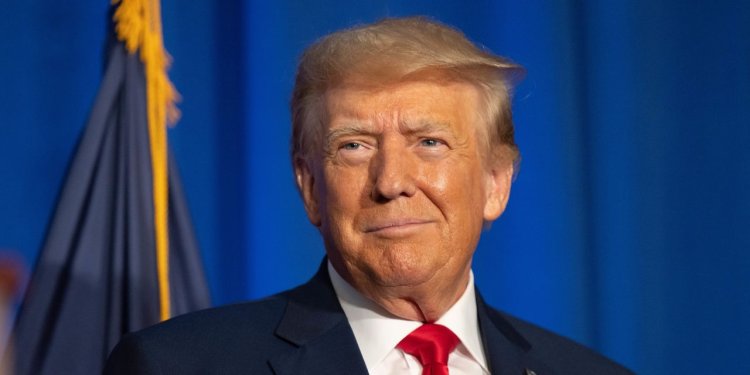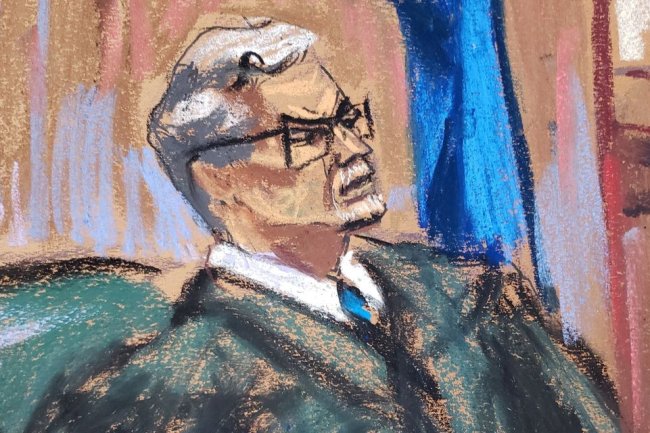May Trump Soon Reach His Waterloo
The former president isn’t Napoleon, but there are similarities in the cults around both men. By Peggy Noonan July 6, 2023 6:09 pm ET Former president Donald Trump in Concord, N.H., June 27. Photo: Scott Eisen/Getty Images If you frequently have a screen on, your impression this summer is that all the hungry things are coming closer in. The sharks are coming closer to shore, the beaches suddenly closed. Bears have been coming in closer for years, deer too. Alligators are advancing onto the golf course and creeping out of the pond. Candidates for president are coming in closer, away from their natural habitat in the greenrooms of the east and into the heartland primary states, marching in July Fourth parades, waving sweatily, hoping someone will wave back. To mark


Former president Donald Trump in Concord, N.H., June 27.
Photo: Scott Eisen/Getty Images
If you frequently have a screen on, your impression this summer is that all the hungry things are coming closer in. The sharks are coming closer to shore, the beaches suddenly closed. Bears have been coming in closer for years, deer too. Alligators are advancing onto the golf course and creeping out of the pond.
Candidates for president are coming in closer, away from their natural habitat in the greenrooms of the east and into the heartland primary states, marching in July Fourth parades, waving sweatily, hoping someone will wave back. To mark their summer kickoff, a few thoughts on the race.
The first primaries are just more than six months away, the first GOP debate is next month, and yet the only thing to be sure of is that clear and consistent majorities of Republicans, Democrats and independents don’t want the choice they’re likely to get, a race between Joe Biden and Donald Trump. It has a depressing effect on political talk. If either party were daring and serious about history, it would shake off its front-runner and increase its chances of winning in 2024. It feels weird that, politics being the cold business it is, neither is making this pragmatic decision.
Democrats are stopped by their fear of the apparatus of presidential power. They’re afraid to push against the big, inert, tentacled power blob that is the presidency. They fear they can’t raise money in such circumstances; they fear unsettling things—better the devil you know—and fear that a challenge to Biden-Harris will be interpreted by a major part of their base as a move against the multiracial first female vice president. They fear their party isn’t organized enough, in a way isn’t real enough, to execute an unexpected national primary race.
If Mr. Biden had more imagination than hunger, he’d apprehend his position and move boldly: “After long thought, I judge that I have done the job set for me by history: I removed Donald Trump and saw to the ravages of the pandemic. I now throw open the gates and say to my party: Go pick a president. You did all right last time, you’ll do fine this time too.” What a hero he’d be—impressive to his foes, moving to his friends. History would treat him kindly too: “Not since George Washington . . .” But he has more hunger than imagination.
Many Republicans, the polls say, are also having trouble letting go.
This weekend I reread Paul Johnson’s “Napoleon,” which came out in 2002, part of his series of brief lives. Johnson paints his subject as genius and devil and spends time on his political unscrupulousness: “French rule was corrupt and rapacious.” In conquered nations France took everything not nailed down, especially art, which would go to the Louvre for the convenience of the world. At birth, nature gave Napoleon great gifts but “denied him things that most people, however humble, take for granted—the ability to distinguish between truth and falsehood, or right and wrong.” He was a mountebank who hid his “small feminine hand” inside his waistcoat and lavished his person with cologne.

Portrait of Napoleon I by Steuben, Charles Auguste.
Photo: Photo Josse/Bridgeman Images
It should be noted, should your mind be going there, that Donald Trump isn’t Napoleon, who was a serious man, or anyone else. He’s a one-off, and of his time.
But Johnson writes of the cult of Napoleon in a way that is now pertinent. As he rose, “the English intellectuals, if that is not too fancy a term, were divided.” Lord Liverpool, who as a young man had witnessed the French Revolution and never got over its horrors, located his place in history: Napoleon was the man who took a violent French mob and turned it into an army that terrorized Europe. William Wordsworth protested his cruel treatment of the peasants in occupied countries; Samuel Taylor Coleridge saw him as a threat to democratic freedoms—“the evil genius of the planet.” Edmund Burke
was of course Napoleon’s most powerful literary foe.Others, still captivated by the revolution, saw him as its residual heir. Some hated monarchy and welcomed Bonaparte as an enemy of the British throne. Some admired him “more as a criticism of British institutions and ruling personalities than in approval of his doings.” The poets John Keats and Percy Shelley saw him as a romantic hero, a daring breakthrough artist of history. Johnson thinks they were influenced by the work of Napoleon’s paid propagandists, especially the painters Jacques-Louis David and Antoine-Jean Gros.
“The cult of Bonaparte was originally wide, but it did not last,” Johnson writes. It had power in the moment, but it passed. Reality settled in; history made its judgments. The cultists changed the subject, or added nuance when pressed to explain their previous support.
But Johnson sees in the Napoleon cult the beginning of something, the rise of mass and effective political propaganda. “In the twentieth century, this infatuation was to occur time and again.” George Bernard Shaw, that brilliant man, fell for Stalin and became his willing dupe. Norman Mailer and others worshiped Castro; French intellectuals celebrated Mao.
Read More Declarations
- What Will Prigozhin’s Rebellion Mean? June 29, 2023
- Why the Titanic Keeps Drawing Us In June 23, 2023
- The Indictment Can Only Hurt Trump June 15, 2023
The Irish writer Fintan O’Toole wrote in the
New York Times in 2017 of Shaw’s loyalty to Stalin. In political cults there is “the tendency to fantasize. . . . There is the same impatience with the messiness and inefficiency of democracy, and it leads to the same crush on the strongman leader who can cut through the irrelevant natterings of parliaments and parties.”Back to now. Chris Christie could easily defeat Joe Biden. So could several of the GOP candidates now in the field. Donald Trump wouldn’t, for one big reason: His special superpower is that he is the only Republican who will unite and rally the Democratic base and drive independents away. He keeps the Biden coalition together.
A sad thing is that many bright Trump supporters sense this, and the case against him, but can’t concede it and break from him, in some cases because they fear him and his friends. They don’t want to be a target, they don’t want to be outside the in-group, they want to be safely inside. They curry favor.
This weekend at a party, one of Mr. Trump’s New York supporters, a former officeholder, quickly made his way to me to speak of his hero. He referred to the Abraham Accords and the economy and said: “Surely you can admit he was a good president.”
He was all wound up, so I spoke slowly. “I will tell you what he is: He is a bad man. I know it, and if I were a less courteous person I would say that you know it, too.”
He was startled, didn’t reply, and literally took a step back. Because, I think, he does know it. But doesn’t ever expect it to be said.
A journalist in our cluster said, musingly, “That was an excellent example of apophasis,” the rhetorical device of saying something by saying you’re not going to say it.
We all moved on, but that was the authentic sound of a certain political dialogue. “Surely you can admit he made France great again.” “He is a bad man.” Its antecedents stretch back in history.
Political cults are never good, often rise, always pass. May it this time come sooner rather than later.
Wonder Land. As the Republican presidential candidates start to offer something more than Donald Trump's various paybacks, President Biden figures running against 'MAGA' is his path to a second term. Images: AP/Getty Images Composite: Mark Kelly The Wall Street Journal Interactive Edition
What's Your Reaction?













